Diastasis recti is a separation of the abdominal muscles (abs) on the left and right sides of your torso. Your abs are made up of two parallel bands of muscles, and are joined vertically at the midline of the abdomen with tissue called the linea alba. These muscles sometimes separate during pregnancy from increased tension on the muscles, and the pregnancy hormone relaxin, which softens body tissues. It causes a bulge in the center of your stomach often labeled the "pregnancy pooch". But no worries, exercises are able to help.
Exercises for Diastasis Recti
1. Diaphragmatic Breathing
Before exercising, you will need to learn how to breathe into your diaphragm.
- Practice diaphragmatic breathing by lying on your back and place your hands at the lower part of your ribs.
- When you inhale, you should be able to feel the diaphragm cause the lower ribs to expand into your hands.
- When you exhale, try to concentrate on contracting your diaphragm, creating a corset effect.
- When you are confident that you're correctly breathing into your diaphragm, you can move on to other exercises for diastasis recti.
2. Standing Push-Ups
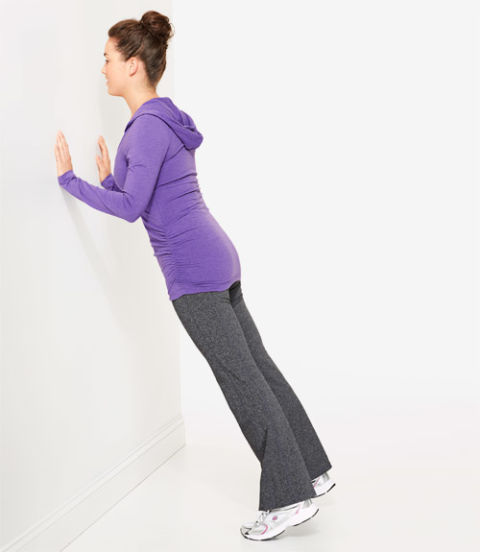 Standing push-up exercises can help heal the condition, while toning your upper body and giving the lower body the stretch of regular push-ups.
Standing push-up exercises can help heal the condition, while toning your upper body and giving the lower body the stretch of regular push-ups.
- Face a wall at arms' length while standing, and place your feet apart in line with your hips.
- Put your palms flat against the wall, and inhale. Remember to breathe into your diaphragm rather than creating a puffed tummy.
- As you exhale, draw your belly in toward your spine. Allow your arms to bend, and lean into the wall while inhaling. Push away from the wall when exhaling, and repeat 8 times.
3. Bridge Pose
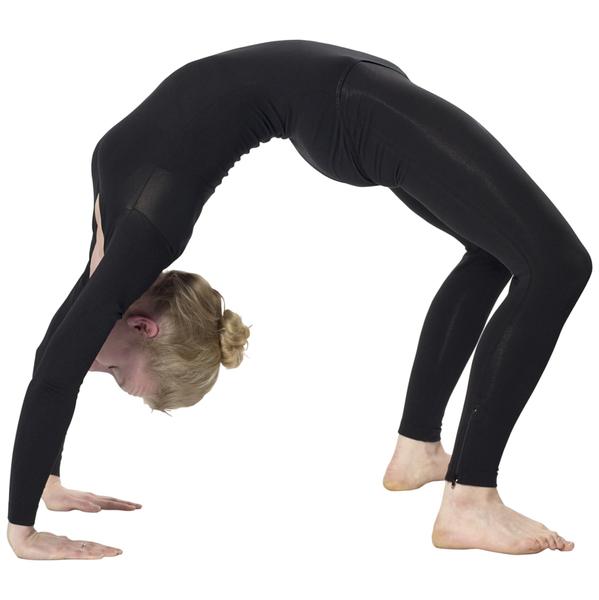 The bridge pose is a more advanced healing exercise.
The bridge pose is a more advanced healing exercise.
- Begin by lying on your back, gently pressing your spine onto the floor.
- Keep your feet flat, your knees bent, and place your arms at your sides with palms facing down.
- Slowly inhale, and when exhaling, tilt your pelvis toward the ceiling in a straight incline with your knees as the highest point, and your shoulders as the lowest.
- Inhale gently and hold the pose, when exhaling, slowly place your spine back onto the floor.
4. Hand Guidance
This exercise uses your hands to massage your abdominal muscles back together into the correct position.
- Begin by lying on your back with your feet on the floor.
- Then cross your hands over each other and place one hand on each side of your abdominal muscles.
- Take a deep breath, and slowly exhale while raising only your head off the floor.
- As your head rises up, gently massage your stomach muscles together. Gently lower your head back and repeat 10 times.
5. Heel Slide
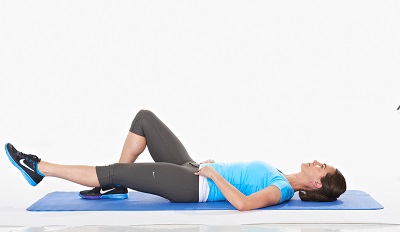 Heel slide exercises for diastasis recti can help heal the transverse abdominis, the muscle group compromised by diastasis recti.
Heel slide exercises for diastasis recti can help heal the transverse abdominis, the muscle group compromised by diastasis recti.- Begin by lying on your back with your feet on the floor, and place your hands palms down under your buttocks.
- Using one leg at a time, and leaving only your heel on the floor, lift your toes while gently sliding this foot out to straighten your leg.
- Hold for five seconds, and slide the leg back in toward you.
- Repeat the exercise on the opposite leg 8 times for each leg.
6. Pelvic Tilt
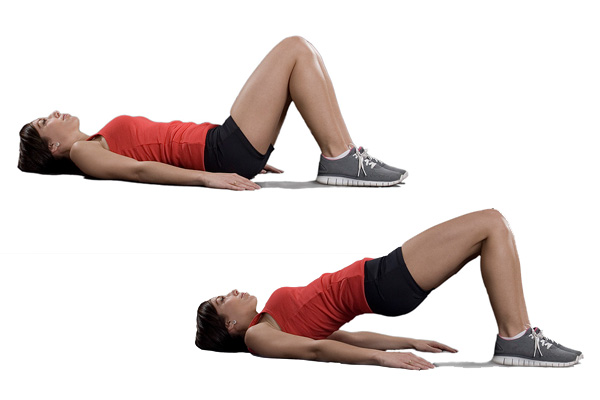 The pelvic tilt helps to strengthen the abdominal muscles with a gentle scooping motion.
The pelvic tilt helps to strengthen the abdominal muscles with a gentle scooping motion.- Begin by lying on your back and extend your left leg, leaving a slight bend in the knee.
- Place your right foot on the floor, with the knee fully bent.
- Without lifting your pelvis or buttocks off the floor, gently tilt your pelvis inwards toward your chest until you feel the lower back move on the floor.
- Return the pelvis to the starting position, and repeat the exercise 10 times.
7. Head Lift
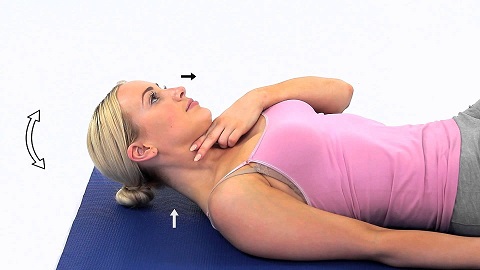 Begin by lying on your back with your knees bent and feet flat on the floor.
Begin by lying on your back with your knees bent and feet flat on the floor.- Inhale, remember to breathe into your diaphragm rather than your tummy, and exhale contracting your abs towards your spine.
- Tuck your chin while raising your head off the floor, and hold for two seconds.
- Return your head to the floor for two seconds and repeat the exercise 30 times.
8. Squat Against the Wall
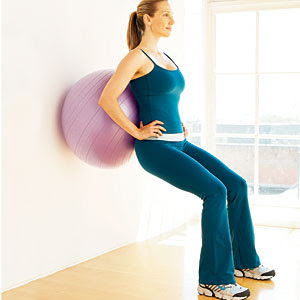 Using a stability ball behind your lower back, stand against a wall.
Using a stability ball behind your lower back, stand against a wall.- Step forward with both feet, keeping them in alignment with your hips.
- Take a deep breath into your diaphragm and exhale contracting your abs towards your spine.
- Lower yourself into a squat by bending your knees, then straighten your legs back into a standing position.
- Take another breath and again contract your abs towards your spine, except this time more deeply. Repeat the exercise 20 times.
9. Side Lying
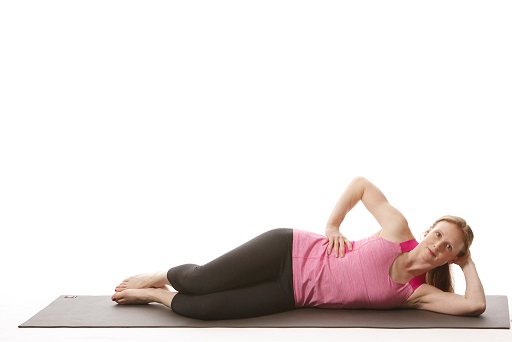 Begin by lying on your side and use your fingers to feel the abs just inside your pelvic bone.
Begin by lying on your side and use your fingers to feel the abs just inside your pelvic bone.- Practice activating your lower abdominal walls using your fingers to gently draw inwards the area above your pelvis. Once you have learned how to activate them, maintain the activation for no more than 10 seconds, then relax them back to resting.
- You should breathe normally and your upper abdomen should be relaxed during this exercise.
10. Flat Lying
- A variation of side lying, flat lying begins with you lying on your back, with your knees bent, and your feet flat on the floor.
- Place your fingers just inside your pelvic bones and gently activate your deep abdominal muscles. Remember to keep the inward curve of your lower back throughout the exercise, and maintain the activation for up to 10 seconds before allowing them to relax again.
- Again, you should breathe normally and your upper abdomen should be relaxed during this exercise.
11. Bent Knee Fall Outs
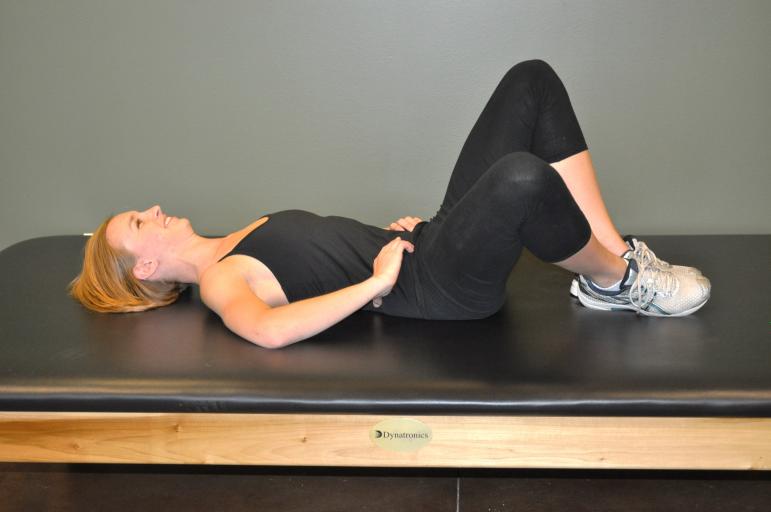 The fall out exercises for diastasis recti focuses on your core muscles.
The fall out exercises for diastasis recti focuses on your core muscles.
- Begin by lying on your back, knees bent, and feet flat on the floor. Activate lower abdominal muscles (same as exercises 9 & 10).
- While keeping your left knee bent and pointing upward, lower your right bent leg to the right side of your body.
- You'll want to avoid trunk rotation by keeping your pelvis stable. When your trunk does begin to move, return your right leg to the starting position and relax.
- Repeat the exercise using the left leg, and 2 or 3 times for each leg.
Here's the step by step guide for 5 more exercises for diastasis recti from:
